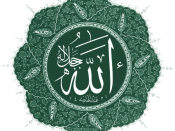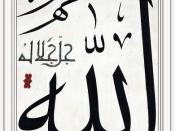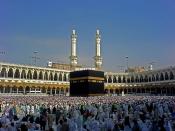Chapter 14 ISLAM:Names(people):Mohammed ibn Abullah- born in Mecca, lost merchant parents and was raised by grandfather and uncle, at age 30 became a merchant, had basic understanding of Judaism and Christianity. At 40, first thought up of Allah and God sending archangel, Gabriel to convert people. He orally transmitted his visions. Moved to Medina because of authorities threatening him because of clash of religions. Reffered to himself as the "seal of all prophets".
Khadija- wealthy widow who Mohammed worked for and then marriedAbu Bakr- caliph after Mohammed's deathAbu al-Abbas- rebel general who put Umayyad Dynasty down. He founded the Abbasid Empire(-1258)Harun al-Rashid - (786- 809) gave out support to writers, artisans, poor. Was caliph at high-point of empire.
Names(other):"hajj"- holy pilgrimage to Mecca by Muslims"Islam"- submission"Muslim"-one who has submitted(one who has accepted Islamic faith)"dar al-Islam"-house of Islam (lands governed under Islamic rule"Allah"- god"Quran"- recitation"hadith" important sayings/customs(9th-11th centuries)"Medina"- the city of the prophet"hijra"- Mohammed's migration- starts off Islamic calendar"umma"- community of the faithful in Medina"ka'ba"- holy shrineFive Pillars of Islam- Allah is only God, all must pray while facing Mecca, all must fast during day of Ramadan, all must give to the poor, all able should make at least one pilgrimage to Mecca"sharia"- Islamic holy law"caliph"- deputySunni Islam- name for the majority of IslamShia Sect- fought for line of (assasinated) Ali to be made caliphs, founded Abbasid EmpireSunnis- traditionalists, founded the Umayyad Dynasty"jizya"- special tax that Umayyad put on all non-converts"madrasas"- places of higher education, started to appear by the 10th centuryUmayyad Dynasty- (661-750) centralized, trade, stable gov't.
Were Arab conquerors.
Abbasid Dynasty- cosmopolitan, not conquerors. Central authority came from the Court of Baghdad.
"sufis"- most notable missionaries, "gave up" lives for Allah, tolerated other culturesDates:570- Mohammed was born620- many people started to join Mohammed622- Mohammed fled w/some...


